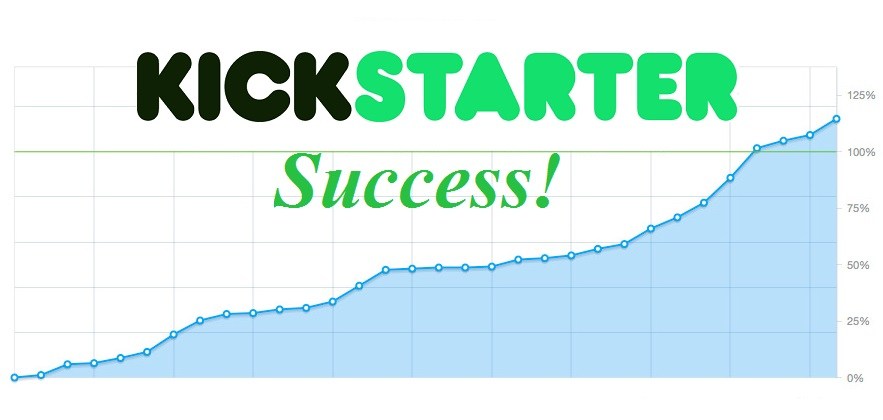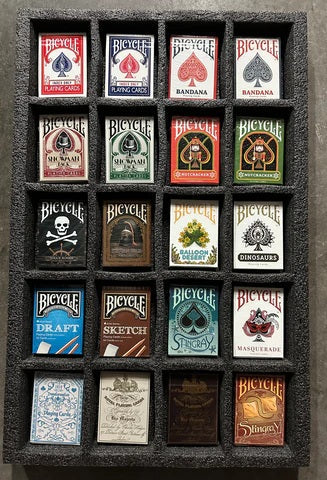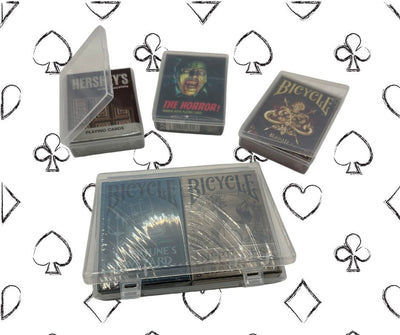Special Content by BoardGameGeek reviewer EndersGame
Kickstarter and Boardgames
It is not difficult to find stories of Kickstarter disasters. We have probably all seen projects seeking funding that were posted by some guy who lives in his mother's basement and has not seen daylight for the last 12 months. He is passionately convinced that the world needs to support his genius concept for a hand-drawn remake of Snakes and Ladders, which will require $200,000 in funding, and for which the only remaining challenge is that he has not yet come up with any rules or artwork. We have also seen many a project get funded only to get delay after delay along the road towards fulfilment, with all the funds mysteriously disappearing in a blaze of glory. In one sad case, the designer claimed to receive a direct revelation from a solar entity commanding them to stop the project. In such cases backers are left with empty hands, and the game never becomes a reality other than in the mind of the creator, and in the often-repeated stories of infamy told by frustrated supporters who never received anything. And then there are the projects that resulted in a sub-par product, and failed to deliver the kind of quality they promised. We could spend hours exchanging horror stories about such disasters.
But how about stories about Kickstarter successes? And fortunately there have been more than a few. There are notable examples of boardgames that have exceeded expectations, and have become bright and shining stars of success, and beacons of hope and optimism for day-dreaming guys in their mother's basements around the world, and to hopeful game designers. There was the Exploding Kittens Kickstarter, which raised a cool $8.8 million - at the time the biggest ever for a crowd-funded game. It was the third biggest Kickstarter campaign of all time, although the fact that it climbed on the back of the hugely popular Oatmeal definitely helped. Other bright lights that have lit up the Kickstarter world as far as the gaming industry is concerned include creator and publisher Jamey Stegmaier, with popular games like Viticulture and Scythe.
There is no doubt that Kickstarter has had a massive impact on the game industry. Publishers have had to reinvent the way they do business, and the way they do marketing. It is no secret that the internet has changed the whole way traditional business works, but Kickstarter in particular has transformed the way much of the industry works. Some big publishers use crowdfunding as a `pre-order' system, whole small publishers often using it to produce games that would otherwise never see the light of day. And in some cases, it has enabled the small guy with a good idea to become a big star, and even make a thriving business.
Kickstarter and Playing Cards
Kickstarter has also had a tremendous influence on the playing card industry. Well-known companies like United States Playing Card Company (USPCC), which produces the famous Bicycle branded decks of playing cards, have been around much longer than Kickstarter. In fact, USPCC has been around even much longer than the internet and computers, or any of the people reading this. It even pre-dates the world's first electricity supply (1881), being established in 1867! There has been some competition along the way, but usually only on a somewhat small scale. In our modern era, the world of custom playing cards especially began to enjoy popularity with companies like Ellusionist and Theory 11 establishing a name for themselves in producing high quality and luxurious decks of custom playing cards, mostly for magicians and card players. To a large extent, companies like these have cornered the custom playing card market in the first decade of the 2000s. To keep a steady stream of income, they simply needed to keep reprinting their existing decks and occasionally add to the range.
That all changed with the arrival of Kickstarter, which has completely exploded the custom playing card industry. Today we live in an era where the market is flooded with all kinds of custom decks. Technology has reached a stage where the smart graphic designer can create a quality deck of playing cards from his desktop computer at home, then partner with quality printing companies, harness the marketing power of crowd-funding via Kickstarter, and produce a lovely deck of playing cards. The field of people doing this today, however, is crowded, and at any given moment there are at least 20 playing card projects on Kickstarter, all competing for attention. Today the challenge is how to find ways to stand out in this crowded field, and there is many a deserving project that fails or struggles to get funded, simply for this reason.
But before the current thriving Kickstarter landscape came to be, there were the pioneers. These were the risk takers who paved the way by seeing the potential for success, and came out of nowhere to become rising stars. In the early days of Kickstarter, projects that today would get lost in the shuffle, instead attracted huge amounts of attention and enjoyed great popularity - and in some cases, massive funding. In some instances, they enabled the common man to even build a business around his Kickstarter success. The world of playing cards is a big one, because almost everybody has played a traditional card game of some sort, and can use a nice deck of cards. But it draws especially on a market populated by board gamers, magicians, and card collectors, so that already gives it the potential to received a broad based support from several sectors. It is not unusual for a very good deck of playing cards to be funded to a healthy figure topping $100,000. One of these big successes in the early days of Kickstarter was Tyler Deeb, and his Misc Good Co deck of playing cards. It is hard to imagine a project like this being successful in today's crowded market, but providentially Tyler put out his project in the right place and the right time. The result is that today he has a thriving business that he has worked hard to establish on the foundation of his initial Kickstarter success. So let's find out more about what happened.

Kickstarter and the Misc Goods Deck
Tyler Deeb is the man behind Pedale Design, which is the label under which he started doing graphic design in 2008. And Misc Goods Co is the name of his company which he started in 2012. He tells his own story on his website here, and I am indebted to his account for much of this next section. His story begins as follows:
"I didn’t intend to start a product company. I left my salary job as an in-house graphic designer to pursue the world of free-lance, jobs were coming in and I felt ready ... One day I showed up to my office and there was no work to do. And with a wife and two kids at home, I couldn’t be idle — my conscience just wouldn’t let me. So, as a discipline for the mind and an opportunity to sharpen my skills, I began designing a single playing card, the jack of spades. It turned out pretty well. The next day I showed up and still no work. So I designed the queen of spades. After three feverish months of this pattern, still workless, I had to my surprise finished designing an entire deck of playing cards."
"I was flat broke. Totally broke. Like, my friend lent me $1,200 to keep my lights on and feed my family type of broke. I was a bit of a mess. I was working hard, but with no income to show for it. It was at this low point that I asked my officemates to help me put together a pitch video and launched a Kickstarter campaign to produce the playing cards I had illustrated by happen-stance."
And so having spent hours and sometimes days designing each card, the Kickstarter was launched around October 2012, with a modest funding goal of $6,250.
You can probably guess what happened next. The project exploded - positively that is! The initial goal was reached within 24 hours. And by the time the project ended, over 4,000 backers were on board, and an astonishing figure of $146,596 had been raised to bring this project to life! It was the first ever playing card project to top the $100k mark. But this was just the beginning for Tyler. He had promised his backers a quick turn-around, and that he would deliver the decks before Christmas. He was determined to make good his word, so he built up a rag-tag team to help him, and worked long hours around the clock. But deliver he did!
And people were happy. Comments on the Kickstarter include enthusiastic praise like "The quality is outstanding"; "The deck is the best I've seen"; "Brilliant quality, original art direction"; "Deck is awesome!" "Looks brilliant. Such a well ran project from start to finish!" "Loving them!!! Great job and i look forward to your future projects"; "Thanks for having such a well-organized project!"; "The best deck of cards I've seen so far. I'm looking forward for new projects!"
So what accounts for the big success? In today's crowded and competitive market, it is hard to understand how a project like this could raise these kinds of enormous figures. But there are some factors that do account for it. For many people, this would have been their first ever experience with a custom deck of playing cards, and so they were delighted to see and receive a beautiful custom deck in a quality edition. And while a deck like this might not stand out among the flood of today's custom decks, many of which have a much higher degree of customization, in its time this was one of the first of its kind, at least as far as Kickstarter was concerned. It also helped that Tyler made good his word about delivery before Christmas, and that he delivered a quality product. Card collectors today are used to getting a high quality deck of custom playing cards for $15, and might wonder why a relatively straight forward deck like this is in a similar price range. But in the context of its time, it had made waves in the mass market, and that is what counted. Tyler himself would probably be one of the first to attribute this to God's providence and timing. He was truly in the right place at the right time, although let's not discount the hard work he put into making this work, and the fact that what he delivered was a quality product. And even by today's standards, his style of black-and-white artwork and court card design remains intriguing and compelling.
Kickstarter and the Misc Goods Company
Tyler's story does not end there. Because he continued to work hard, building on this success to produce Misc Goods Co, an actual company in the market place. He now had a solid base of customers who were interested in his future products, and he had also received a lot of publicity and support. He began reinvesting his Kickstarter earnings into creating new products: second edition decks, a hard case, a wallet, and a flask. At that point it was still a hobby, and he was relying on free lance graphic design with Pedale Design for paying his bills. But after attending a commerce start-up conference towards the end of 2013, he had the ideas and impetus he needed to devote the attention and energy that Misc Goods Co needed to become truly successful.
Today his products can be found in boutique shops around the world. If you check out his magnificent website, you will see a wide range of products that includes art and prints, flasks, wallets, and even cologne. These are not cheap products, but Misc Goods Co is quickly becoming a lifestyle brand, with this vision: "We build products with practical purpose — keepsakes which are set apart. Manufactured in America, our goods are timeless in form and use, both for home and abroad." While none of this comes easy, and they have not hit a great stride yet, Misc Goods Co is growing, and on the way to success.
Here is how Tyler himself sums up his story, where Kickstarter plays a central role: "Misc. Goods Co. was born out of circumstances. It wasn’t the result of planning or dreaming or a conversation sparked among friends. I had simply positioned my professional life in such a way that it could bend and shift; changing as opportunity came and working hard when it did. My opportunity came in the form of a monstrously successful Kickstarter campaign. It changed my life and handed me a new set of responsibilities – to remain ethical in our manufacturing while staying thoughtful in our design, to push forward – ever-content, but never comfortable, to make Misc. Goods Co. a business I can be proud of for as long as I'm permitted to have pride." He is a family man who wants to work hard, while remaining principled.
For Tyler, his Kickstarter experience was truly life-changing, although his own hard work and dedication certainly played a big role. All this has brought him to where he is today, owner of a company that has now put out the third edition of his signature Misc Goods Co decks of playing cards.
The story of Tyler Deeb and the Misc Goods Co Playing Cards is an amazing one. Tyler would be the first to say that even the miscellaneous goods he produces are not exempt from the transience of life, and that we should not be fixated on fleeting things that fade and perish. Even so, it is nice to have a quality deck of playing cards to enjoy over the years of our temporary sojourn here on planet earth. And in a world of so many Kickstarter misses, it is nice for once to be able to share a truly life-changing story of a genuine Kickstarter success.
And to think that it all began with a deck of playing cards!
Do you have an epic an kickstarter success or fail to share? We would love to hear about it.
About the writer: EndersGame is a well-known and highly respected reviewer of board games and playing cards. He loves card games, card magic, cardistry, and card collecting, and has reviewed several hundred boardgames and hundreds of different decks of playing cards. You can see a complete list of his game reviews here, and his playing card reviews here. He is considered an authority on playing cards and has written extensively about their design, history, and function, and has many contacts within the playing card and board game industries. You can view his previous articles about playing cards here. In his spare time he also volunteers with local youth to teach them the art of cardistry and card magic.






1 comment
Great going with the blog so far. Love what you’re posting here. Good variety of different articles. Keep it up